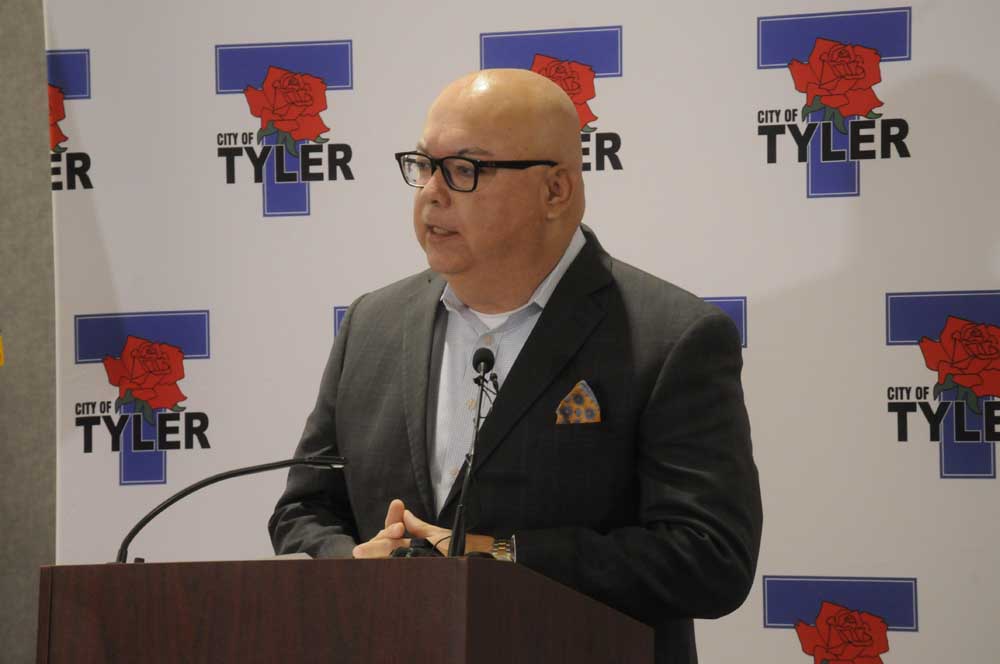Smith County Commissioners discuss mental health, development
Published 5:40 am Wednesday, February 26, 2025

- Scott Martinez, executive director of the Tyler Economic Development Council, joins local officials in celebrating the completion of the waterline extension project. (Katecey Harrell/ Tyler Morning Telegraph)
For thousands of Smith County residents, accessing mental health care is more efficient and reliable, thanks to a coordinated system with built-in checks and balances.
“Without a person looking at each one of those intercepts and programs I supervise, it’s hard to believe we didn’t completely fall apart,” said Keisha Morris, Andrews Center Chief SIM Officer. “We’ve made a lot of improvements … We find things every day we need to fix.”
The Smith County Commissioners Court met Tuesday to hear updates on mental health programs from the Andrews Center, financial reports from the Tyler Economic Development Council and agreements with political subdivisions for holding their May elections.
Sequential Intercept Mapping (SIM) is a model used to assess resources, identify service gaps and plan for improvements in mental health care.
The model outlines how individuals navigate a mental health crisis and the entities they encounter along the way. It includes six intercept points — Intercept 0 through Intercept 5 — covering community services, law enforcement interactions, detention and court hearings, jails and courts, reentry and community corrections support.
“Before there were so many silos and people would just shut down,” Morris said. “Now we communicate. We’ve got points of contact.”
Morris coordinates between the different intercepts, coordinating six teams.
Grant funding supports programs such as jail-based competency restoration and the addition of two new jail navigators. A new program, Respite, started in September 2024 and provides short term crisis services in a home-like setting for people at low risk of harming themselves or others.
The jail navigators aim to divert individuals from the justice system while maintaining oversight of those in custody. They conduct psychiatric screenings both pre- and post-booking, assist with jail diversion, support forensic services and ensure continuity of care for incarcerated individuals, including aiding in their release.
The approach has contributed to improved mental health outcomes while acknowledging there is always room for improvement. In total, the Andrews Center has provided more than $190,000 in goods and services in the jail and nearly $800,000 to the county.
{strong style=”font-size: 1.17em;”}Economic development{/strong}
Mental health care contributes to a healthier community, which fosters a thriving economic landscape.
Scott Martinez, president and CEO of the Tyler Economic Development Council (TEDC), provided the court with a financial update and an overview of recent projects.
TEDC is a private organization, setting it apart from most economic development organizations in Texas. Funded by its 150 members, the TEDC operates with a fraction of the budgets of neighboring organizations and has been a steward of efficiency long before many others.
“We’re receiving a lot of interest in companies looking at Smith County as a location … to grow their business,” Martinez said.
There are about seven potential projects underway, with a median average of 200 jobs created, offering annual salaries of about $65,000, $50 million in capital investments, 40 acres of land and 150,000 square feet of buildings.
“That’s the market demand we are seeing currently,” Martinez said.
Construction of a 140,000-square-foot Amazon delivery station is expected to be completed by September. Additionally, County Road 3344, which leads to the Tyler Interstate Commerce Park, has been paved with blacktop, and guardrails have been installed. Final striping and finishing touches are expected to be completed in the next few weeks.
Local elections
As the county grows with new developments, officials are also gearing up for local elections.
Commissioners approved political subdivisions for the May 3 election, including five cities and four school districts, along with facility use agreements for election sites at various churches, schools and community centers across the county.
During public comment, Thomas Fabry of Grassroots America: We The People called for a public update on Smith County road bond projects, saying they are significantly delayed and over budget. In response, Judge Neal Franklin said County Engineer Frank Davis will provide a project update at the next week’s meeting.
In other business:
• Smith County employees reached service milestones this month. Lorri Robertson from the District Attorney’s Office marks 25 years. George Williams with the Sheriff’s Office, Esmeralda Corona with Human Resources and Russell Smart with the Road & Bridge Department reached 10 years. Deborah Clark and April Wilson with the Sheriff’s Office, Laura Payne with the 321st District Court, Amanda Jackson with the District Clerk’s Office and Michael Velasquez with the Road & Bridge Department have completed five years.
• Commissioners approved the reappointment of Marcia Daughtrey as the Smith County representative to serve a two-year term on the Northeast Texas Regional Mobility Authority (NET RMA) Board of Directors, from Feb. 1 to Jan. 31, 2027.
• The court approved a plaque donation from the Alamo Letter Society. The 203-pound bronze plaque containing Co. William Travis’s Alamo “Victory or Death,” letter written in 1836.
• The emergency management coordinator was authorized to apply for two grants: one for an onsite response trailer, which will be used for response to mass casualty events and reunification efforts; the other to support the Smith County Emergency Response Team with response and deployment kits for use during disaster operations.






